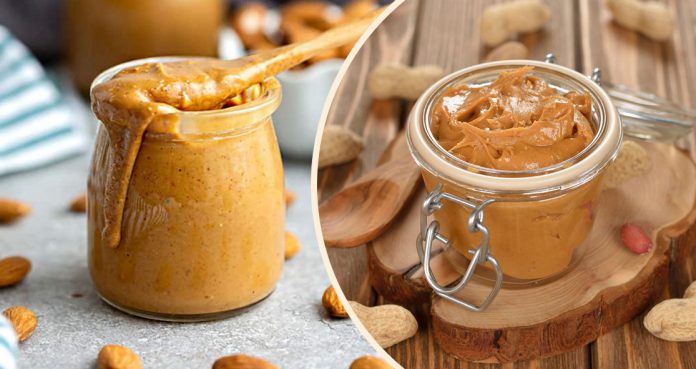Peanut butter is undeniably one of our favorite snacks, thanks to its easy availability, nutrition value, and of course, flavor. However, over the years, almond butter has also been used by people across the globe. So, is almond butter really healthier than peanut butter?
Registered dietitian Kelly Hogan from New York City helps us set the record straight.
Hogan says, “Not only is almond butter more expensive than PB—around $10 per jar versus $4 for peanut butter—it’s also on the “eat-this” lists for many restrictive, trendy diets, including Paleo and Whole30.” That is because of the fact that almonds are nuts and peanuts are legumes, a source of carbohydrates that has been excluded from many diets. Therefore, almond butter is often considered a healthier option.
Take a look at the nutrition value of both the kinds of butter:
Almond Butter
- Serving size: 2 tablespoons
- Calories: 196
- Fat: 18 grams
- Unsaturated fat: 14 grams
Peanut Butter
- Serving size: 2 tablespoons
- Calories: 188
- Fat: 16 grams
- Unsaturated fat: 12.5 grams
“People assume almond butter is way healthier than peanut butter, but it’s just as caloric,” says Hogan.
There are also subtle differences in both of them. Almond butter is slightly rich in antioxidants, vitamin E, iron, and fiber. The dietician says, “But none of these reasons are enough to say almond butter is healthier.”
Both of them contain about 7 or 8 grams of protein. “Typically, you want a post-workout snack to have about 15 grams of protein, so a sandwich with almond or peanut butter is a good component to your recovery fuel,” explains Hogan.
As far as the fat content is concerned, almond butter and peanut butter are high in unsaturated fat (the good fat) and have a little saturated fat. Hogan states, “That unsaturated fat has plenty of health benefits, including improving heart and brain health, making you feel full, and even fighting muscle inflammation.”
Also, studies have found that in spite of nuts, including peanuts, being high in calories, consuming them in moderation on a regular basis will not lead to weight gain.
Hogan concludes, “Unless you’re allergic to peanuts, almond butter isn’t the better-for-you snack it’s been hyped up to be. Both options are a healthy accompaniment to a snack or meal designed to fuel your ride or recovery.”
Having said that, you must be a bit more cautious when it comes to choosing a brand of peanut butter. “It’s more common to see peanut butter, which has been commercially available longer than almond butter, loaded with added sugar, oils, and emulsifiers,” explains Hogan. The dietician added that in some cases, peanut butter is impregnated with some added salt, which may help replenish your electrolyte balance. However, beyond that, simply look for peanuts or almonds on the label.























